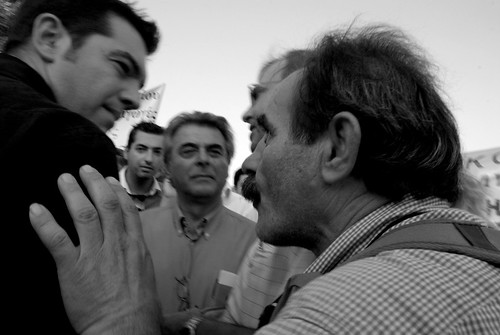The
announcement last week that none of the parties in the Greek
government were able to form a government has brought with it a dose
of madness that dwarfs even the fervid election campaign rhetoric
that proceeded it. If you were to take the statements of much of theforeign and local mainstream media at face value Greece is about to collapse andthat it will take with it much of the Eurozone.. Once again
Athens is at the centre of a maelstrom of media speculation that can
be seen as a retread of 2011 when the Greek prime minister, GiorgiosPapandreou raised the possibility of Greece holding a referendum on
whether it should implement yet more austerity measures . Then the suggestion was met by a
vociferous campaign from within Greece, not to mention the pressure exerted by Paris,Brussels and Berlin.
With
Papandreou now gone from the political scene, his role as the
Eurozone's enemy number one has been taken over by Alexis, Tsipras,
the leader of the Radical Left Coalition (SYRIZA), which if the name didn't
give you a clue is a group of socialist and communist parties who
shot into second place in the May elections campaigning on the
promise to defy European Union's demands for yet more austerity
measures.
The
results has been a surge of interest in Greece and a concerted
attempt to paint anti-austerity politicians and parties as extremist and dangerous. The new media narrative being created goes like this; Tsipras and, by extension any political group opposed to the terms set
down by Athens's creditors are putting in danger Greece's place in
the Eurozone and so inviting economic collapse by forcing it to
re-adopt the drachma. Some variations on this theme even go as far as
to say that Greece may even by kicked out of the EU, and so face
decades of North Korean style isolation.


It is a
story that has been carefully cultivated in the local press as well,
with daily horror stories coming out in the state run TV stations and
their allies in the privately controlled media sector. Pro-austerity
parties such as PASOK and New Democracy appear regularly to crank up
the fear factor by painting the Radical Left as a bunch of crazed
fanatics hell bent on destroying what's left of the economy.
If that
wasn't enough this week's non-story about a run on Greek banks was
gleefully jumped upon and news organisations were desperately trying
to recruit local bloggers/twitter users to feed them stories of
people besieging banks to take out their money. Rumours of banks
limiting withdraws to just 50 E swirled around the internet. That
neither was happening proved to be no impediment to reporters eager
to get another scoop.
The fact
that this week the EU decided to cut off funding to Greek banks it
deemed non-viable did nothing to help the situation , leading some
commentators to say that maybe that was their intention after all. An
example of yet more attempts to nudge the Greek electorate in the
“right”direction.


This week
also saw the arrival of EU president, Martin Schulz in Athens,
obstensibly to persuade the new Greek government to adhere to its
earlier fiscal commitments, however, his public appearances with both
the leaders of PASOK and New Democracy made it quite clear that the
EU wanted it's say in Greece's next round of elections. A message
with he then went to repeat on state run and pro-austerity channels
yesterday and today.
If that
wasn't enough the suggestion by German chancellor Angela Merkel toGreek president KarolosPpapoulias that Greece hold a referendum on
membership of the euro was meets by angry accusations of interference
in Greek internal affairs. Raising ugly memories of the two countries
troubled past relationship.
Ironically,
the suggestion, which the German chancellor's office denied (the
office of the Greek president then went on to deny the denial) has
helped undermine the position of those parties who are hoping to
persuade Greek voters to swallow more job cuts and tax increases
scheduled for June.


Whether
the fear of expulsion from the Eurozone is working is hard to tell.
Some local opinion polls have put New democracy ahead of SYRIZA but
then there are otherσ which show wildly differing results. The problem
is that no one knows what will happen in June. Gauging public opinion
has become much harder when the two main political parties are
constantly changing their make up and positions. PASOK has decided,
under it determinedly uncharismatical leader, Evangelos Venizelos to
distance itself from both scandal ridden past by abolishing much of
its present hierarchy.
On the
other hand Greece's right has seen a flurry of deals and team
changes. With members of the smaller unsuccessful parties jumping
ship to sign up with Samaras's right rainbow alliance. Howe much of
this will change the results of the elections is hard to say. Many of
those retuning to New Democracy such as ex party super star, Dora
Bakoyianni, northern populist, Panayiotis Psomiadis (once again the subject of legal proceedings) and
former MPs with the far right LAOS party are hardly the stuff that
electoral landslides are made of.
With a
party made up of those willing to change political allegiances at the
drop of a hat, it is going to difficult to persuade sceptical voters
that the right won't result to yet more u-turns and back flips if
elected.


Far away
from the endless media attention to those in mainstream politics,
ordinary Greeks continue to face the everyday grind of surviving in a
shrinking economy in which 30-40% are living in poverty, more than
half the country's youth (some of the most educated in Europe) are
without work and no one knows when things will get better.
Beyond
vague promises to renegotiate the terms of Greece's bailout, only
SYRIZA has offered something positive to those who have already lost
so much. Even if it's the empty gesture of defiance it gives
something concrete to those left bitter and disillusioned by the
country's more moderate political choices.

1 comment:
Very well said! I love your articles!AriadnefromGreece!
Post a Comment